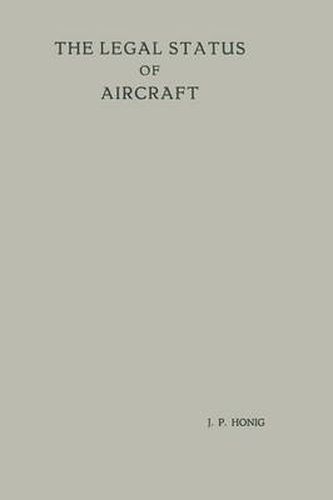Readings Newsletter
Become a Readings Member to make your shopping experience even easier.
Sign in or sign up for free!
You’re not far away from qualifying for FREE standard shipping within Australia
You’ve qualified for FREE standard shipping within Australia
The cart is loading…






This title is printed to order. This book may have been self-published. If so, we cannot guarantee the quality of the content. In the main most books will have gone through the editing process however some may not. We therefore suggest that you be aware of this before ordering this book. If in doubt check either the author or publisher’s details as we are unable to accept any returns unless they are faulty. Please contact us if you have any questions.
I . Historical survey The legal status of aircraft is a problem that has given rise to innumerable questions ever since the earliest years of aviation. But the majority of these questions only relate to certain aspects of the legal status of aircraft, and the problem as a whole has hardly been studied at all. The evolutionary process in the study of a number of facets of the problem is outlined below. Nationality The question of the nationality of aircraft has always received a lot of attention. As far as the principle is concerned, there can be little dispute on this point nowadays. The subject of the nationality of aircraft was discussed at the aviation conferences which led to the Paris Convention in 1919, the Ibero-American Convention in 1926, the Havana Convention in 1928 and the Chicago Convention in 1944. According to Article 6 of the Paris Convention of 1919, an aircraft possesses the nationality of the State on whose register it is entered. The Ibero-American Convention of 1926 and the Pan-American Convention signed at Havana in 1928 start from the same principle.
$9.00 standard shipping within Australia
FREE standard shipping within Australia for orders over $100.00
Express & International shipping calculated at checkout
This title is printed to order. This book may have been self-published. If so, we cannot guarantee the quality of the content. In the main most books will have gone through the editing process however some may not. We therefore suggest that you be aware of this before ordering this book. If in doubt check either the author or publisher’s details as we are unable to accept any returns unless they are faulty. Please contact us if you have any questions.
I . Historical survey The legal status of aircraft is a problem that has given rise to innumerable questions ever since the earliest years of aviation. But the majority of these questions only relate to certain aspects of the legal status of aircraft, and the problem as a whole has hardly been studied at all. The evolutionary process in the study of a number of facets of the problem is outlined below. Nationality The question of the nationality of aircraft has always received a lot of attention. As far as the principle is concerned, there can be little dispute on this point nowadays. The subject of the nationality of aircraft was discussed at the aviation conferences which led to the Paris Convention in 1919, the Ibero-American Convention in 1926, the Havana Convention in 1928 and the Chicago Convention in 1944. According to Article 6 of the Paris Convention of 1919, an aircraft possesses the nationality of the State on whose register it is entered. The Ibero-American Convention of 1926 and the Pan-American Convention signed at Havana in 1928 start from the same principle.